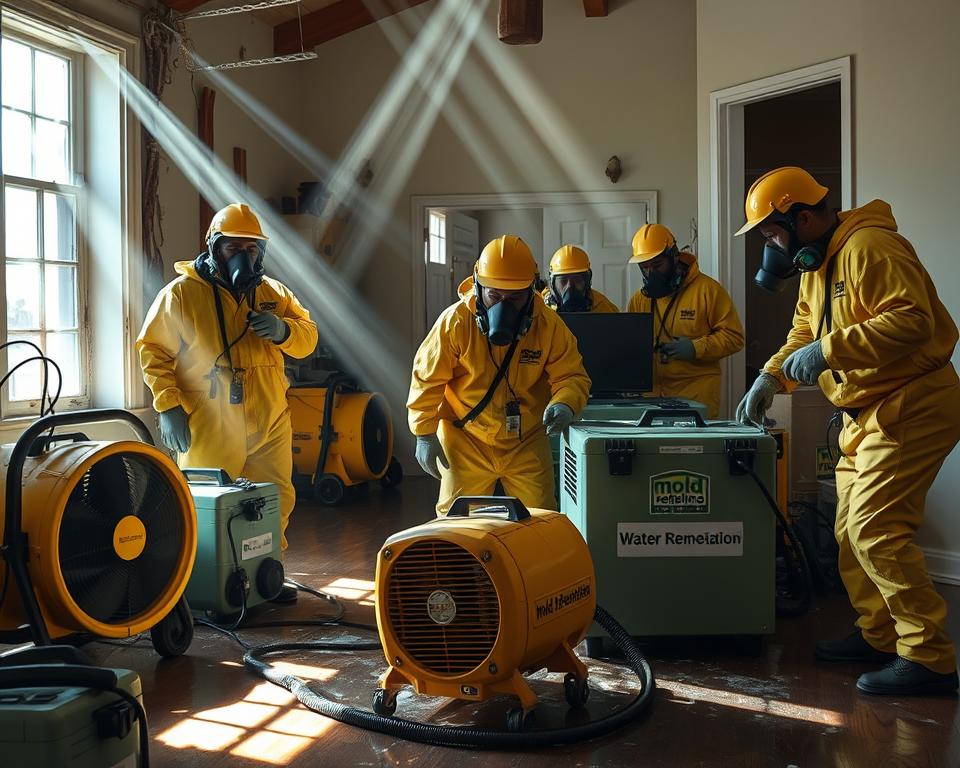Imagine discovering a hidden issue threatening your property’s safety. Within hours, unchecked moisture can warp floors, weaken walls, and create unhealthy conditions. How quickly could a skilled team resolve it before lasting harm occurs?
Every minute counts in urgent situations. Certified professionals use advanced tools to assess risks, extract excess moisture, and restore affected areas. Their methods align with industry standards, prioritizing both speed and thoroughness.
Homeowners often praise the quick turnaround of trusted local services. One review states, “They arrived faster than we expected and explained every step clearly.” This blend of transparency and action helps prevent secondary issues like structural decay or air quality concerns.
24/7 availability ensures no delay in tackling problems, day or night. Specialists also document their process, providing clarity for insurance claims. Their goal? To return your space to its pre-incident condition—safely and efficiently.
Key Takeaways
- Immediate response minimizes long-term risks to property and health.
- Advanced drying techniques prevent hidden moisture from causing future issues.
- Certified teams follow strict protocols for safe, effective cleanup.
- Round-the-clock availability ensures help arrives when you need it most.
- Detailed documentation supports insurance processes and peace of mind.
Understanding Emergency Water Damage and Mold Risks
Unaddressed dampness doesn’t stay hidden—it announces itself through visible and sensory warnings. Left unchecked, these issues can escalate quickly, threatening both your property’s stability and indoor air quality. Early detection remains the most effective way to minimize harm.
Identifying Water Damage Symptoms
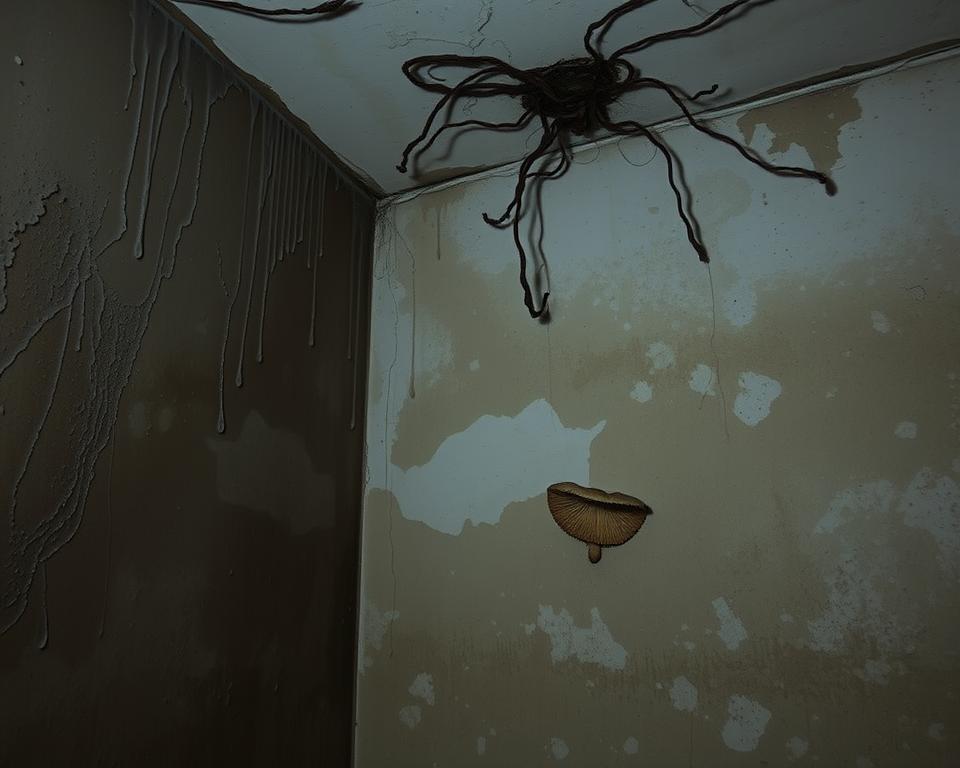
Subtle changes often signal trouble. Warped floorboards, peeling paint, or persistent damp odors suggest moisture intrusion. Discolored drywall and swollen door frames also point to hidden leaks. Acting within 48 hours can prevent costly structural repairs.
| Symptom | Common Locations | Recommended Action |
|---|---|---|
| Warped surfaces | Floors, window sills | Inspect plumbing |
| Musty smells | Basements, bathrooms | Check ventilation |
| Discoloration | Ceilings, walls | Professional assessment |
Recognizing Mold Growth and Health Concerns
Fuzzy patches on walls or a sour, earthy scent often indicate fungal growth. According to the CDC, “Exposure to damp environments may cause wheezing or stuffiness, especially in allergy-prone individuals.” Children and seniors face higher risks of respiratory irritation.
Documentation proves critical when addressing these challenges. Take timestamped photos of affected areas and maintain records of humidity levels. Most insurance policies require this evidence before approving restoration claims. When visible growth exceeds 10 square feet, experts recommend professional cleanup to ensure safe removal.
Comprehensive Water Damage Restoration Services
When excess moisture invades a space, rapid intervention determines how fully a property can recover. Certified teams deploy specialized strategies tailored to each situation, combining technology with expertise to reverse harm caused by leaks or flooding.
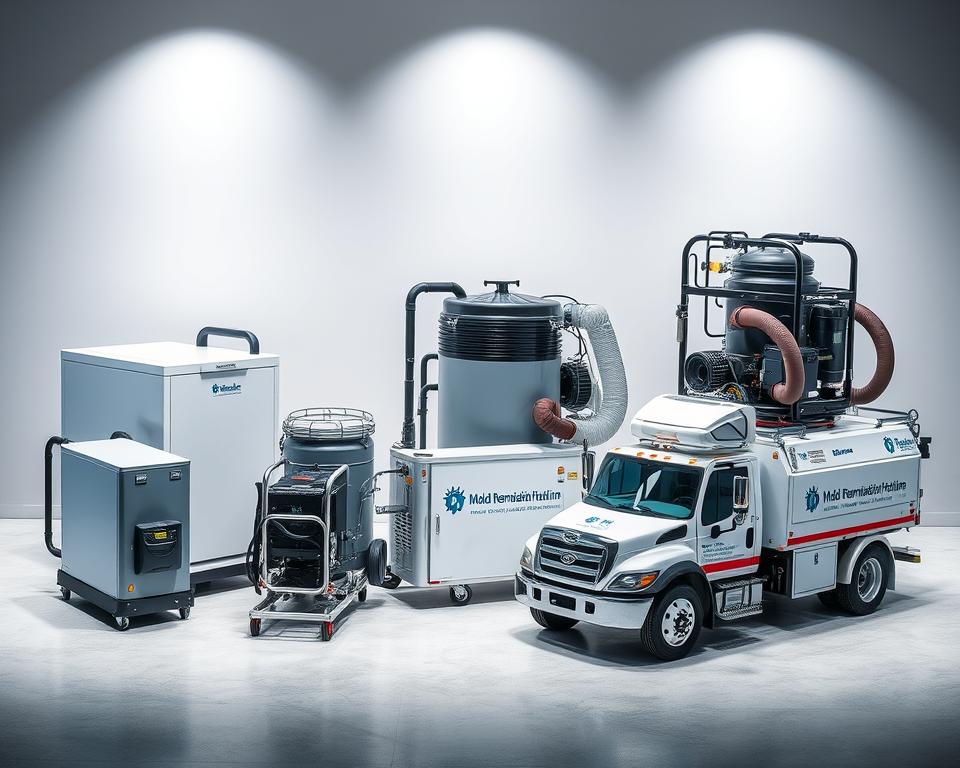
Efficient Water Extraction and Drying Procedures
Industrial-grade pumps swiftly remove standing liquid, while infrared cameras detect hidden dampness in walls or subfloors. High-speed air movers and desiccant dehumidifiers then accelerate evaporation, reducing drying times by up to 70% compared to conventional methods. This precision prevents warping and microbial growth.
Thorough Property Cleaning Methods
After structural drying, technicians sanitize surfaces using EPA-approved solutions. Carpets undergo hot-water extraction to eliminate contaminants, while upholstery receives targeted treatments. One client noted, “They restored our office carpets so thoroughly, you’d never guess there was a pipe burst.”
These restoration services apply to both homes and businesses, with flexible scheduling to minimize downtime. Post-cleanup inspections confirm air quality meets safety standards, ensuring spaces feel fresh and functional again. By addressing every layer of harm—from soaked drywall to stained fabrics—professionals help properties regain their original integrity.
Professional Mold Remediation and Restoration
Hidden fungal colonies pose risks to both health and structural integrity. Certified teams use science-backed methods to eliminate threats while safeguarding your space. Their approach balances immediate results with lasting protection against recurrence.
Safe Mold Removal Techniques
Containment barriers and negative air pressure prevent spore spread during cleanup. Technicians wear protective gear while applying EPA-registered antimicrobial solutions. HEPA vacuums capture microscopic particles, reducing airborne contaminants by 99.97%.
One homeowner shared, “They sealed off the affected area completely—we felt safe throughout the process.” Post-removal air testing confirms spaces meet OSHA safety thresholds before reoccupation.
Long-Term Prevention Strategies
Controlling humidity levels below 60% starves fungal colonies of moisture. Experts recommend installing ventilation fans in high-risk areas and inspecting plumbing quarterly. Infrared cameras help detect hidden leaks early.
Many companies provide maintenance checklists post-restoration. These include:
- Monthly humidity monitoring
- Annual duct cleaning
- Prompt repair of condensation issues
| Prevention Method | Action Steps | Frequency |
|---|---|---|
| Moisture Control | Use dehumidifiers, fix leaks | Daily/As needed |
| Airflow Improvement | Install vents, clean filters | Quarterly |
| Structural Checks | Inspect walls, roofing | Biannually |
IICRC-certified professionals combine these tactics with customized solutions. Their damage restoration protocols ensure treated areas remain clean, dry, and resistant to future growth.
Rapid Emergency Response and 24/7 Service
When your property faces unexpected moisture intrusion, swift action separates temporary inconvenience from lasting harm. Specialized teams operate around the clock, equipped to evaluate risks and deploy solutions within critical timeframes. Their expertise transforms chaotic situations into controlled recoveries.
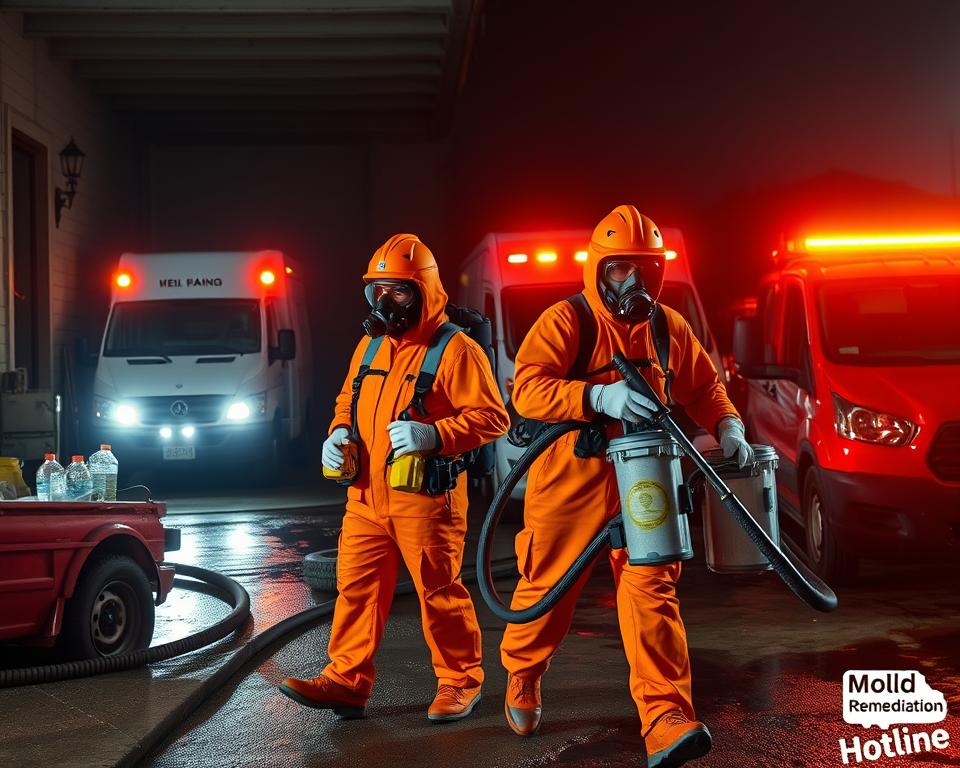
Immediate Damage Assessment
Certified technicians arrive prepared to analyze affected spaces using moisture meters and thermal imaging. 94% of providers guarantee onsite evaluations within 60 minutes of initial contact, according to industry surveys. This rapid triage identifies priority zones needing urgent attention.
| Response Factor | Average Time | Local Coverage |
|---|---|---|
| Initial Call to Dispatch | Under 15 minutes | 50-mile radius |
| Onsite Evaluation | Within 1 hour | 24/7 availability |
| Cleanup Initiation | Immediate | All service areas |
Delayed interventions allow secondary issues like material warping or microbial growth. One client reported, “They stopped our basement leak from becoming a major renovation project.” Proactive measures reduce repair costs by up to 40% compared to postponed actions.
Teams coordinate directly with insurance providers, documenting every step for claim accuracy. Their service areas typically span multiple counties, ensuring broad accessibility. By merging speed with precision, these professionals safeguard both property value and occupant well-being.
emergency water damage mold remediation near me
Property crises demand solutions tailored to your unique situation. Leading restoration companies prioritize your peace of mind through customized plans and transparent communication. This approach transforms stressful events into manageable recovery journeys.
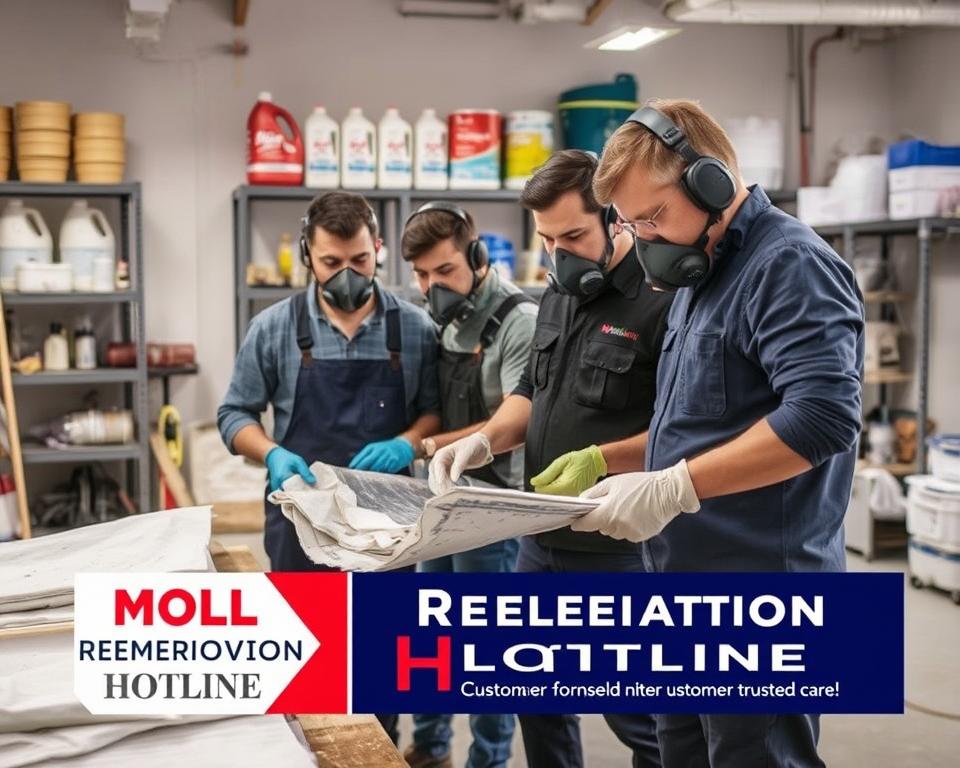
Customer-Focused Remediation Approach
Seasoned experts begin by evaluating your home’s specific needs. They listen to concerns, inspect affected areas, and explain remediation steps in plain language. One client remarked, “They treated our house like their own—no rushed decisions or hidden fees.”
Insurance coordination forms a critical part of the process. Teams handle claim documentation, providing itemized reports with photos and moisture readings. This support helps 87% of homeowners receive full claim approvals faster, according to industry data.
Key aspects of personalized service include:
- 24/7 availability for immediate assessments
- Real-time updates via preferred communication channels
- Post-restoration air quality testing
Technicians use advanced water damage restoration methods to return properties to their original condition. From structural drying to odor removal, every action focuses on long-term results. Same-day responses minimize disruption, letting families reclaim their spaces quickly.
When challenges arise, a dedicated team guides you from initial call to final inspection. Their expertise turns complex procedures into streamlined solutions—because your home deserves nothing less than complete care.
State-of-the-Art Equipment and Restoration Techniques
Modern restoration hinges on precision tools that outpace traditional methods. Advanced technology enables specialists to address issues faster while preserving structural integrity. These innovations transform complex challenges into systematic solutions.
Advanced Water Extraction Tools
Submersible pumps remove standing liquid 50% faster than standard units, according to industry tests. Infrared moisture detectors scan walls and floors, identifying hidden saturation points invisible to the naked eye. One technician noted, “Our thermal imaging tools often find trouble spots homeowners didn’t realize existed.”
Effective Drying and Air Duct Cleaning
High-velocity air movers circulate dry air across surfaces, while desiccant dehumidifiers extract 95% more moisture than conventional models. For duct systems, rotary brushes dislodge debris, and HEPA vacuums capture 99.97% of particulates. This dual approach prevents lingering odors and microbial growth.
Key equipment features include:
- Adjustable suction settings for different flooring types
- Real-time humidity sensors for accurate drying timelines
- Antimicrobial coatings on cleaning tools
These methods protect materials from warping and decay. By combining cutting-edge gear with proven techniques, restoration teams deliver results that stand the test of time—and moisture.
Additional Restoration Services and Cleanup Expertise
Unexpected disasters require versatile solutions beyond immediate threats. Specialized teams address multiple challenges, from scorched walls to stained fabrics, ensuring properties regain functionality and aesthetics. Their expertise spans residential and commercial needs, adapting to diverse scenarios with precision.
Combatting Fire and Smoke Effects
Thermal fogging neutralizes stubborn odors by replicating fire’s heat patterns, penetrating porous materials. Ozone treatments further purify air, breaking down harmful compounds. One restaurant owner noted, “After a kitchen fire, they eliminated every trace of smoke smell—our diners never noticed a thing.”
Debris removal follows strict safety protocols. Technicians sort salvageable items from hazardous ash, using industrial vacuums with HEPA filters. This prevents soot particles from recirculating into living spaces.
Reviving Textiles and Surfaces
Hot-water extraction cleans carpets 40% faster than steam methods, lifting deep-seated dirt and allergens. For delicate upholstery, encapsulation techniques use crystallizing solutions that trap contaminants without overwetting fabrics.
| Method | Best For | Benefits |
|---|---|---|
| Hot-Water Extraction | High-traffic areas | Removes 98% of bacteria |
| Encapsulation | Office furniture | Dries in 1-2 hours |
| Dry Cleaning | Antique rugs | Preserves delicate fibers |
Storm-related issues demand unique approaches. Teams extract floodwater from basements while sanitizing surfaces against microbial growth. Both home-based businesses and corporate facilities benefit from tailored schedules that minimize operational disruptions.
Insurance Support and Streamlined Claims Process
Navigating insurance paperwork after property incidents often feels overwhelming. Restoration specialists simplify this journey by bridging communication gaps between clients and providers. Their expertise turns complex forms into manageable steps, letting you focus on recovery.
Guidance Through Insurance Claims
Certified teams begin by reviewing your policy to identify coverage limits and requirements. They photograph affected areas, record moisture levels, and compile evidence for adjusters. One homeowner shared, “They handled all the insurance details, which took a huge weight off our shoulders.”
Key documentation steps include:
- Timestamped photos of affected property areas
- Detailed moisture mapping reports
- Itemized repair cost estimates
Professionals coordinate directly with insurance agents to fast-track approvals. Industry data shows 83% of claims with expert support get processed within 7 business days. This efficiency reduces stress for families and home-based businesses alike.
| Step | Team Action | Client Benefit |
|---|---|---|
| Initial Assessment | Create damage inventory | Clear claim foundation |
| Documentation | Submit digital files | Faster adjuster review |
| Follow-Up | Monitor claim status | Fewer delays |
Damage cleanup timelines align with insurer requirements to prevent coverage disputes. By merging technical skills with insurance knowledge, these experts transform chaotic situations into structured recovery plans.
Conclusion
Protecting your property demands swift, expert solutions. Certified restoration services tackle issues from soaked drywall to smoke-stained walls, using industrial-grade tools for thorough cleaning and structural repairs. One client noted, “Their team restored our basement faster than we imagined possible.”
Comprehensive care extends beyond immediate fixes. Professionals address fire aftermath with thermal fogging, combat microbial growth through advanced removal techniques, and streamline insurance paperwork. Their coordinated approach minimizes downtime for businesses and households alike.
Trust matters when reclaiming your space. Modern equipment like infrared scanners and HEPA filtration ensures spaces meet safety standards. 24/7 availability means help arrives precisely when needed—whether at 3 AM or during holiday closures.
Don’t let delays worsen existing problems. Contact trusted local professionals today to restore your property’s condition efficiently. Their expertise transforms chaos into confidence, one resolved job at a time.
